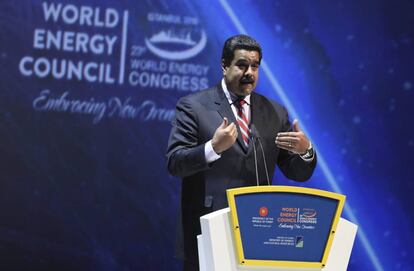Venezuela’s state-owned oil company on the brink of default
Macroeconomic policies of ‘chavista’ regime and falling oil prices strain capitalization at PDVSA
In an attempt to persuade the majority of investors to accept a debt-swap deal, Petróleos de Venezuela (PDVSA), Venezuela’s state-owned oil company, decided to extend the deadline for offers to October 21. A statement published on the company’s website carries the tone of an urgent plea and ultimatum: failure to garner at least 50% participation in the swap deal “will hurt” its ability to make payments on its existing debt.

Such a warning, especially after PDVSA pushed back the deadline three times since it made the initial debt exchange offer in September, indicates the serious challenge the Maduro administration faces when it comes to accessing the necessary liquidity to meet the commitments of an elephantine government that provides almost everything for its citizens, not to mention the lack of confidence the largest company in the South American country – which contributes 96% of the total national budget – inspires in its investors.
The macroeconomic policies of the chavista regime and falling oil prices have not helped bolster confidence in the swap deal either, though President Maduro has insisted that his administration will meet all debt obligations as it has until now.
PDVSA bonds were “the most profitable asset on all global markets in the last two years,” economist Ramiro Molina claimed
“As of the deadline – 5pm New York time on October 17 – “a substantially lower percentage than 50% of the total capital amount of the existing bonds had been offered,” the company admitted in a statement. Improving swap offers would improve the company’s liquidity in the short term, it added, before warning that should the exchange fail to go through, PDVSA “will evaluate all alternative options.” The above-mentioned improvement means exchanging $5.3 billion in bonds that mature in 2017 for new bonds that will mature in 2020.
Before the announcement, PDVSA said it would honor its commitments regardless of the results of the swap. But then its bond prices slipped each time it extended the deadline for offers due to fears that the company might have to suspend the transaction and default on its heavy debt obligations in the next 15 months, Reuters reported.
On Monday, several analysts appeared on Venezuelan TV discussing their view on the opportunities that the company’s bonds represented for investors. PDVSA bonds were “the most profitable asset on all global markets in the last two years,” economist Ramiro Molina claimed in a discussion on Globovisión. Ecoanalítica, a financial consulting firm, was also enthusiastic about the company’s returns. “With conservative estimates from Citgo, the Houston-based Venezuelan oil company, PDVSA 20’s price should be between 82% and 84.2%,” it said.
PDVA’s statement warns that the company might extend the deadline again at its discretion. The Nicolás Maduro administration seems ready to push it to the latest date possible to avoid paying investors. If the exchange deal goes through with 75% participation, Ecoanalítica says PDVSA will free up $4 billion in liquid assets between 2016 and 2017. Venezuela will hold crucial elections during both years that will determine whether the chavista regime remains in power.
PDVA’s statement warns that the company might extend the deadline again at its discretion
PDVSA is one of the largest exporters of crude oil and owner of the largest reserves in the world. But Venezuela is also the country with the highest volume of oil still underground. According to some estimates, the Latin American country could continue to extract this natural resource at the current rate for the next 300 years without exhaustion. This year, however, Venezuela had to buy American light crude oil for the first time. Its own very heavy crude is difficult to refine and must be mixed with lighter types before it can be exported to other nations.
In 2015, total production at PDVSA fell to 2.7 million barrels a day according to the Organization of the Petroleum Exporting Countries (OPEC), more than a million barrels fewer than it produced a decade ago.
English version by Dyane Jean François.
Tu suscripción se está usando en otro dispositivo
¿Quieres añadir otro usuario a tu suscripción?
Si continúas leyendo en este dispositivo, no se podrá leer en el otro.
FlechaTu suscripción se está usando en otro dispositivo y solo puedes acceder a EL PAÍS desde un dispositivo a la vez.
Si quieres compartir tu cuenta, cambia tu suscripción a la modalidad Premium, así podrás añadir otro usuario. Cada uno accederá con su propia cuenta de email, lo que os permitirá personalizar vuestra experiencia en EL PAÍS.
¿Tienes una suscripción de empresa? Accede aquí para contratar más cuentas.
En el caso de no saber quién está usando tu cuenta, te recomendamos cambiar tu contraseña aquí.
Si decides continuar compartiendo tu cuenta, este mensaje se mostrará en tu dispositivo y en el de la otra persona que está usando tu cuenta de forma indefinida, afectando a tu experiencia de lectura. Puedes consultar aquí los términos y condiciones de la suscripción digital.








































